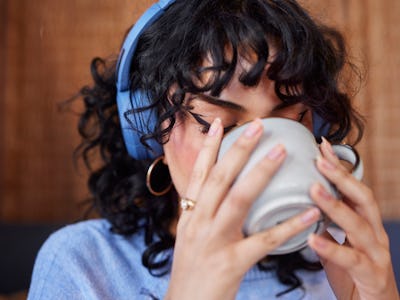On this website, some posts contain affiliate links, which means that if you buy a product using my link, I may earn a commission.
Drinking coffee when tired might provide a quick energy boost, however, it is not a suitable replacement for sleep. Lack of sleep can impair alertness, response times, and cognitive functions.
Relying on coffee to combat tiredness can potentially have negative consequences. Consuming caffeine too close to bedtime can interfere with sleep, as it blocks the effects of adenosine, a chemical responsible for inducing sleepiness. Additionally, excessive coffee consumption can lead to dehydration and disrupt sleep patterns.
While caffeine can temporarily improve wakefulness, it does not enhance performance on tasks. Therefore, it is important to prioritize sleep rather than relying solely on coffee as a solution for tiredness.
Can Coffee Provide An Adequate Substitute For Sleep?
Can Coffee Provide an Adequate Substitute for Sleep?
Although coffee can provide a quick pick-me-up, it is not an adequate substitute for sleep. Sleep deprivation can reduce alertness, slow down response times, and negatively affect thinking. Drinking more coffee in an effort to overcome tiredness might backfire. It’s important to note that while coffee does keep you awake, it can also leave you dehydrated and disrupt sleep patterns.
While caffeine can boost mood, energy, and concentration, drinking coffee should not be relied upon as a solution for fatigue. It’s crucial to address the root cause of tiredness and prioritize getting enough sleep. Experts recommend avoiding caffeine after lunchtime to ensure it doesn’t interfere with falling asleep at night.
The bottom line is that although coffee can provide a temporary boost, it is no substitute for proper rest and sleep. It’s best to prioritize quality sleep for optimal health and well-being.
Why Does Coffee Make You Tired?
While coffee can provide a quick pick-me-up, it is not an adequate substitute for sleep. Drinking more coffee when tired might backfire, as sleep deprivation can reduce alertness and negatively affect thinking. It’s best to avoid caffeine too close to bedtime to prevent insomnia.
Drink Enough Sleep – Healthline While coffee can temporarily provide a boost of energy, it is not a substitute for proper rest. Sleep deprivation can lead to decreased alertness, slower response times, and impaired cognitive function. Although caffeine can block adenosine receptors in the brain, preventing sleepiness, the body can adapt to its effects over time, resulting in reduced effectiveness. Drinking coffee too close to bedtime can also disrupt sleep patterns, keeping you awake when you should be winding down. It is generally recommended to avoid consuming caffeine after lunchtime to ensure a restful night’s sleep. While caffeine can help to temporarily alleviate fatigue, it is not a cure for sustained tiredness. Proper sleep and good sleep hygiene should always be prioritized for optimal well-being.What Time Is The Latest You Should Drink Coffee?
Should You Drink Coffee When TiredDrinking coffee when tired can provide a quick pick-me-up, but it is not a substitute for proper sleep. While caffeine can boost mood, energy, and concentration, it does not eliminate the need for sleep. Sleep deprivation can negatively affect alertness, response times, and thinking. It is important to understand that relying on coffee to overcome tiredness might backfire. Consuming coffee too close to bedtime can disrupt sleep patterns and keep you awake. As a general guideline, it is recommended to avoid caffeine after lunchtime. Terry Cralle, a registered nurse and representative of the Better Sleep Council, suggests this rule of thumb. While coffee can temporarily help with fatigue, it is crucial to prioritize quality sleep for overall well-being.


Credit: www.inverse.com
The Limitations Of Coffee For Staying Awake
| Should You Drink Coffee When Tired |
| The Limitations of Coffee for Staying Awake |
While coffee can provide a quick pick-me-up, it is not an adequate substitute for sleep. Sleep deprivation can reduce alertness, slow down response times, and negatively affect thinking. Drinking more coffee in an effort to overcome tiredness might backfire. Caffeine blocks adenosine from working on brain cells, preventing you from feeling sleepy. However, the body eventually adapts to the effects of caffeine, diminishing its effectiveness. Additionally, drinking caffeine too close to bedtime can disrupt sleep patterns and keep you awake. It’s important to note that coffee can also leave you dehydrated. Instead of relying solely on coffee, consider natural alternatives for energy, such as exercising or taking power naps. While caffeine can help you stay awake if you’re sleep deprived, it may not significantly improve your performance on tasks. Moderation is key when consuming caffeine, and it’s recommended to avoid caffeine after lunchtime to ensure a good night’s sleep.
The Power Of Coffee Naps
The Effectiveness Of Combining A Cup Of Coffee With A Quick NapWhile coffee can provide a quick pick-me-up, it is not an adequate substitute for sleep. Sleep deprivation can reduce alertness, slow down response times, and negatively affect thinking. Drinking more coffee in an effort to overcome tiredness might backfire. Caffeine blocks adenosine from working on brain cells, which prevents you from feeling sleepy. However, the body adapts to caffeine over time. Drinking caffeine too close to bedtime can keep you awake and disrupt sleep patterns. Experts recommend avoiding caffeine after lunchtime to promote better sleep. While coffee naps, which involve drinking a cup of coffee and then taking a quick nap, are more effective than coffee or naps alone, caffeine should not be relied upon as a cure for fatigue. It can only do so much if you don’t get enough sleep. In moderate amounts, caffeine can boost mood, energy, and concentration. Research has shown that drinking coffee increases mental alertness and reduces tiredness, making it beneficial for those trying to study. However, if coffee makes you tired, it may be a sign that you’re not getting enough sleep. It’s important to prioritize sleep and establish a healthy sleep schedule. Knowing the right time to drink coffee is also essential. Drinking caffeine too late in the day can interfere with falling asleep at night. Ultimately, finding a balance between caffeine consumption and getting enough sleep is crucial for overall well-being. |
Does Coffee Help With Learning When Tired?
Drinking coffee when tired is a common practice for many individuals seeking a quick energy boost. While coffee can provide a temporary increase in alertness and concentration, it should not be seen as a substitute for adequate sleep. Sleep deprivation can have negative effects on mental alertness, response times, and cognitive function. While caffeine can enhance mood, energy, and concentration in moderate amounts, it is crucial to be mindful of the timing of coffee consumption. Consuming caffeine too close to bedtime can interfere with sleep, potentially leading to further tiredness. Additionally, drinking excessive amounts of coffee in an attempt to combat tiredness may have negative consequences such as dehydration and disruption of sleep patterns. However, research has shown that consuming coffee in moderate amounts can increase mental alertness and reduce tiredness, making it beneficial for individuals who are studying or need to focus on tasks. It is recommended to consume caffeine in moderation, be aware of its effects on individual sleep patterns, and consider other strategies for combating fatigue.
Frequently Asked Questions Of Should You Drink Coffee When Tired
Does Drinking Coffee Help You Learn When Tired?
Drinking coffee when tired might provide a temporary boost, but it’s not a substitute for sleep. Sleep deprivation can impact alertness and thinking. However, in moderate amounts, caffeine can increase mental alertness and reduce tiredness, which can be beneficial for studying.
Drinking coffee too close to bedtime can disrupt sleep.
Should I Stop Drinking Coffee If It Makes Me Tired?
No, you should not stop drinking coffee if it makes you tired. While coffee can provide a temporary energy boost, it is not a substitute for sleep. Drinking more coffee to combat tiredness may not work and can have negative effects on alertness and thinking.
It is best to prioritize getting enough sleep instead.
What Time Is Too Late For Coffee?
It is generally recommended to avoid drinking coffee after lunchtime to ensure it doesn’t interfere with your ability to fall asleep at night. Caffeine can keep you awake, and consuming it too late in the day may disrupt your sleep patterns and leave you feeling tired.
Should I Drink Coffee If I Didn’t Sleep?
Drinking coffee when tired might give a temporary energy boost, but it is not a substitute for sleep. Coffee can disrupt sleep patterns and make you more alert, but it won’t improve performance or prevent tiredness in the long run.
It’s best to prioritize getting enough sleep instead.
Conclusion
Although coffee can provide a temporary boost of energy, it is not a suitable replacement for proper sleep. Continuous sleep deprivation can have negative effects on alertness, response times, and cognitive functioning. Moreover, consuming more coffee to combat tiredness may have adverse consequences.
It is essential to prioritize getting enough sleep rather than relying solely on caffeine. So, the next time you feel tired, consider getting some rest instead of reaching for another cup of coffee. Your body will thank you in the long run.
On this website, some posts contain affiliate links, which means that if you buy a product using my link, I may earn a commission.

